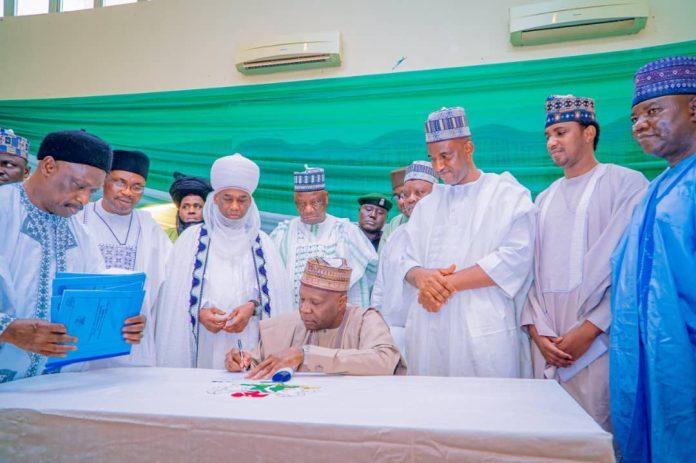By Ismaeel Aleem
Gombe State Governor, Muhammadu Yahaya, has signed into law the Local Council Development Areas (Creation and Administration) Bill, establishing 13 new Local Council Development Areas (LCDAs) in the state.
The reform expands Gombe’s administrative structure from the existing 11 Local Government Areas (LGAs) to 24 units, marking what the governor described as a “historic moment” in the state’s democratic journey.
Speaking at the signing ceremony in the government house yesterday, Yahaya said the initiative was designed to correct long-standing structural imbalances.
READ ALSO: Ex-Gombe gov candidate Bala declares himself ADC national chair
He noted that despite the state’s vast landmass, larger than 15 other states, and its growing population, the state had one of the fewest LGAs in the country.
“This reform corrects historical anomalies, broadens governance frontiers, and ensures equitable service delivery to underserved communities,” the governor stated, citing Sections 4(7) and 5(2b) of the 1999 Constitution as its legal basis.
The newly created LCDAs, modelled after successful examples such as Lagos State’s, include: Akko North (Amada), Akko West (Pindiga), Balanga South (Bambam), Billiri West (Taal), Dukku North (Malala), Funakaye South (Tongo), Gombe South (Bolari), Kaltungo East (Wange), Kwami West (Bojude), Nafada South (Birin-Fulani), Pero-Chonge (Filiya), Yamaltu East (Dadinkowa), and Yamaltu West (Zambuk).
According to officials, the new councils are expected to reduce ungoverned spaces, strengthen security, create jobs, and improve access to essential services in response to rapid population growth.
Yahaya directed both the new LCDAs and existing LGAs to prioritise four key sectors, security, basic education, primary healthcare, and agriculture, and gave administrators a six-month timeline to deliver measurable results.
Acknowledging concerns over financing, he argued that the long-term benefits far outweighed the costs, drawing parallels with the gains from the state’s own creation in 1996.
He assured residents of “a new era of inclusive development and stronger local governance.”
To ensure a smooth rollout, Yahaya announced the establishment of a high-powered Transition Technical Committee, chaired by the deputy governor, which will include state officials, local government representatives, and civil society actors.
Interim management committees will oversee the initial phase, supported by an Executive Order for phased implementation.
READ ALSO: Gunmen kill ECWA pastor in Gombe
The bill, which was unanimously passed by the state House of Assembly, has already secured broad support from traditional rulers, community leaders, and political stakeholders.
As the state embarks on this new phase of local governance, residents are hopeful that the reforms will bring more responsive leadership and accelerated development at the grassroots.



